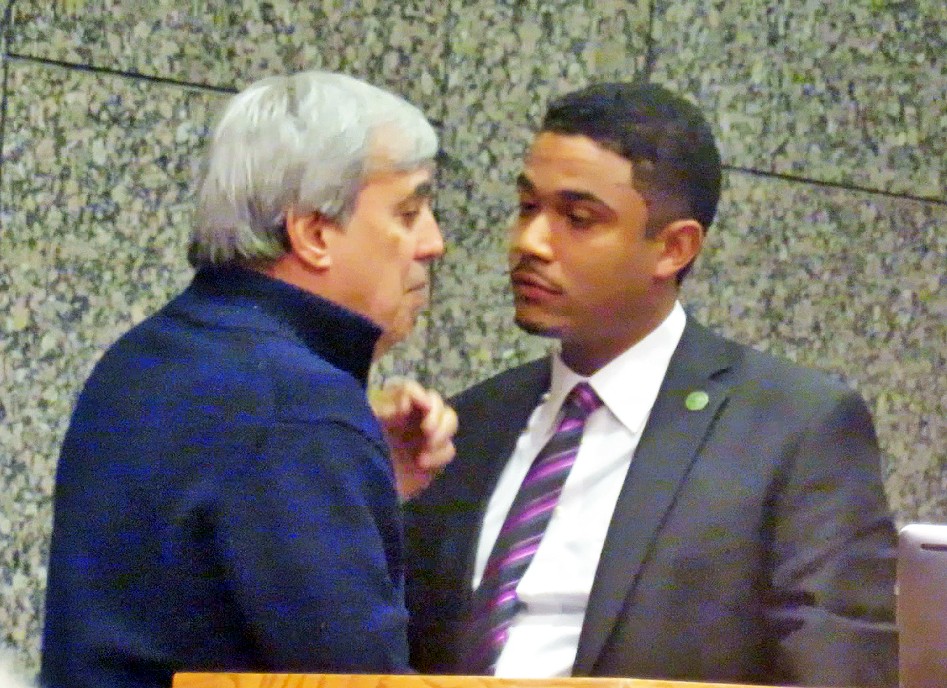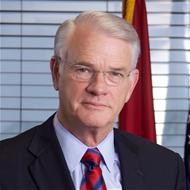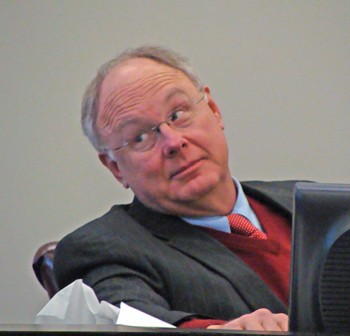 JB
JB
Attorney Krelstein and Justin Ford confer just prior to chairman Ford’s agreeing to deal with plaintiffs
It took a while, both in the long run (two and a half months since the standoff began, in the immediate wake of the August 7 election) and in the short term (two hours of mind-bending intricacy at Monday’s climactic public meeting), but the Shelby County Commission’s power struggle finally ended — or seemed to — with a win-win solution.
Both of the warring party-line-plus-one factions were claiming victory, in any case — the one composed of six Democrats and one Republican (Steve Basar), and the one containing five Republicans and one Democrat (Justin Ford).
The solution involved a willingness by the D-Plus-Ones to give up their ongoing Chancery Court lawsuit against chairman Ford (for his seemingly high-handed control of what could be placed on the Commission agenda) in return for the R-Plus-Ones’ agreement to drop their appeal of an adverse decision by Chancellor Jim Kyle, coupled with Ford’s acceptance of majority rule in determining agenda items.
Ford and his Republican allies claimed victory because they had fended off what Republicans Heidi Shafer and Terry Roland saw as an effort by the D-Plus-Ones to “overthrow” Ford’s chairmanship. The Democratic coalition — whose ad hoc leaders were newbie Van Turner and the veteran Walter Bailey — claimed victory because they had forced Ford to yield on his arbitrary control of the agenda.
Virtually lost sight of in the two-sided celebration (which followed an exhausting and repetitious squabble settled evidently in an off-to-the-side chat by competing lawyers Turner and Ron Krelstein) was the origin of the dispute, in the chairmanship election held on September 8 by a freshly elected Commission with six new members.
The GOP’s Basar, who had been vice-chair in 2013-14, had expected to be elected chairman and was shocked when the majority of Republicans opted instead for the candidacy of Roland, switching to Democrat Ford when the Millington Republican seemed obviously about to fall short.
Ford was ultimately elected on the basis of his own vote and that of the Commission’s six Republicans (including the stunned Basar, who would shortly have a change of mind). Bailey, the Commission’s senior Democrat, was meanwhile outraged by his second-place finish to Ford, whose long-term chumminess with Republicans and openness to their agenda were no secret.
At the Commission’s next meeting, on September 22, Bailey and five other Democrats, along with Basar, voted together to block the committee appointments made by Ford. Eventually, weeks later, Ford would get his way on the committee matter, but in the meantime the battle had shifted to the matter of an agenda item which Basar kept proposing and Ford kept rejecting.
That agenda item, which proposed a rules change allowing agenda items to be added on the basis of simple majority votes and not by a 2/3 super-majority, became the basis of a Democratic coalition lawsuit against Ford’s alleged violations of Commission rules via his persistent rejections.
Two weeks ago Chancellor Kyle declined to rule outright on the suit, finding instead that the Commission had no rules because it had adopted none for the new body and directing Commissioners to adopt new rules or to re-adopt the body’s former rules.
Hence a motion for an amended rules package presented as an add-on by Basar on Monday, igniting another round of the ongoing factional dispute — partly tedious, partly fascinating — and going over all of the same old issues dividing the body.
As indicated in a prior post on this site, the amended rules package contained new clauses calling for the majority-rule principle and essentially removing the chairman from any control over agenda items. Deleted from the package, on a finding by County Attorney Marcy Ingram that it conflicted with the county charter, was a clause declaring that the chairman served “at the will and pleasure of the Commission.”
[pdf-1]
When the deal finally came sometime after 6:00 p.m. on Monday, the two sides had agreed (on a motion by Ford!) to refer the rules matter to the next meeting of the general government committee, resolved to drop their respective legal actions, and to do the trade-off indicated in Paragraph Three above: Ford can feel secure in his chairmanship, though he has had to sacrifice the power over the agenda which he had previously claimed and employed.
Either both sides won, or both sides lost. The question now becomes: Do the two party-line-plus-one coalitions continue to cohere, or do they break apart, a major part of their raison-d’etre having dissolved?

 Jackson Baker
Jackson Baker 

 Jackson Baker
Jackson Baker  Jackson Baker
Jackson Baker